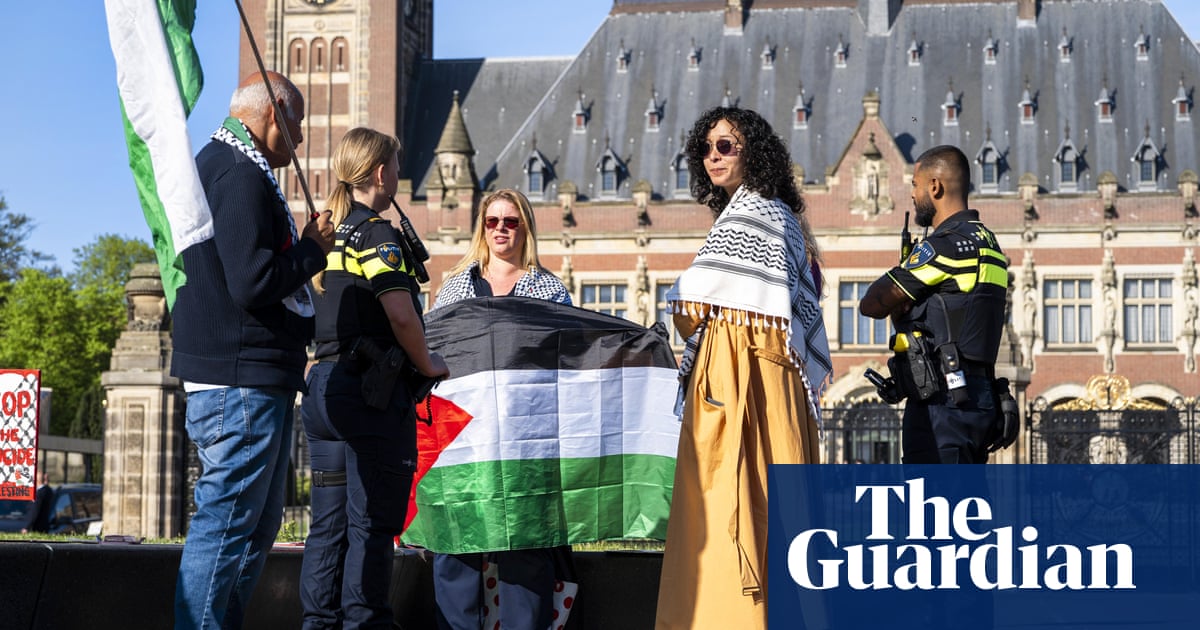The very nature of the UN is threatened by Israel’s refusal to accept the rights of its agencies to operate freely in the occupiedPalestinian territories, the international court of justice has heard.
The statement was made at the start of five days ofproceedings in The Haguethat may prove critical to Israel’s future within the world body. The UN’s top court will hear from dozens of nations and organisations in order to draw up an advisory opinion on Israel’s humanitarian obligations to Palestinians more than 50 days into itstotal blockade on aid entering Gaza.
Israel is not participating but has submitted oral evidence claiming its decision to end all cooperation with Unrwa, the UN relief agency for Palestinians, was necessary because of infiltration by Hamas.
In her 30-minute opening submission to the court, the UN under-secretary general for legal affairs, Elinor Hammarskjöld, opted for a full-throated assertion of the immunities and privileges of the UN and its subsidiary bodies under the UN charter and 1946 convention on UN privileges.
She said Israel had no right unilaterally to declare UN bodies were not impartial and so deny cooperation or aid, adding: “When the basic elements of this [the charter’s] legal framework are not observed, the very nature of the work of the organisation on behalf of its member states is in jeopardy.”
Hammarskjöld said that, if UN member states had complaints about the neutrality of an organisation such as Unrwa, established mechanisms existed for this to be addressed.
Israel’s complaints had been examined by relevant UN bodies but the full cooperation of member states, including the furnishing of documents, was also required, she said. This was a thinly coded assertion that Israel has not backed up some of its claims of mass Hamas infiltration with evidence to the UN. Independent investigations have also found that Israel had not provided evidence for its headline allegation.
The Palestinian ambassador to theNetherlands, Ammar Hijazi, accused Israel of breaching international law in the occupied territories.“Israel is starving, killing and displacing Palestinians while also targeting and blocking humanitarian organisations trying to save their lives,” he told the court.
“Nine of every 10 Palestinians have no access to safe drinking water. Storage facilities of the UN and other international agencies are empty. These are the facts. Starvation is here. Humanitarian aid is being used as a weapon of war.”
In a sign of the breakdown in relations, Israel’s foreign minister, Gideon Sa’ar, said on Monday that the ICJ hearing was part of a “systematic persecution and delegitimisation of Israel”.
“It is not Israel that should be on trial. It is the UN and Unrwa,” he told reporters in Jerusalem.
In its written evidence to the court, Israel argues no obligation exists to respect the immunities of a UN agency “where the legitimate security concerns of a member state are severely undermined by the agency in question, whose conduct manifestly contravenes the fundamental principles of neutrality, impartiality, and independence”.
The UN general assembly has ordered the UN to seek an ICJ advisory opinion on whether Israel had overriden the immunities of a UN body by its policy of non cooperation. The policy has forced Unrwa to suspend operations in Gaza and the West Bank.
Hammarskjöld told the court the proceedings were crucial to clarify some fundamental elements of the legal framework of the UN’s status. She pointed out that Israel’s UN membership entailed legal obligations that were essential for the organisation to properly function and carry out the mandates. These included “good faith and cooperation with the organisation, respect for the safety of UN premises, property assets and personnel, and obligations concerning the immunities of UN properties so that the UN can fulfil its obligations”.
The Palestinian lawyers injected greater emotion into the pleadings by focusing on the impact of Israel’s refusal to allow aid into Gaza, for instance showing the judges Instagram postings of traumatised doctors describing conducting amputations on children without medicines.
Israel strictly controls all inflows of international aid for the 2.4 million Palestinians in the Gaza Strip. It halted deliveries on 2 March, days before the collapse of a ceasefire that had significantly reduced hostilities after 15 months of war. Supplies are dwindling and the UN’s World Food Programme on Friday said it had sent out its “last remaining stocks” to kitchens.
Paul Reichler, representing the Palestinians, told judges that one of the Geneva conventions “not only lays down that the occupying power must agree to relief schemes on behalf of the population, but insists that it must facilitate them by all the means at its disposal”.
The UN was the first to address the court on Monday, followed by Palestinian representatives. In total, 40 states and four international organisations are scheduled to participate.
On Tuesday, South Africa, a staunch critic of Israel, will present its arguments. In hearings last year in a separate case at the court,the country accused Israel of committing genocide against the Palestinians in Gaza– a charge Israel denies. Those proceedings are still under way. Israel’s’s ally, the US, is scheduled to speak on Wednesday.The court will probably take months to rule. Experts say the decision, though not legally binding, could profoundly impact international jurisprudence, international aid to Israel and public opinion.
